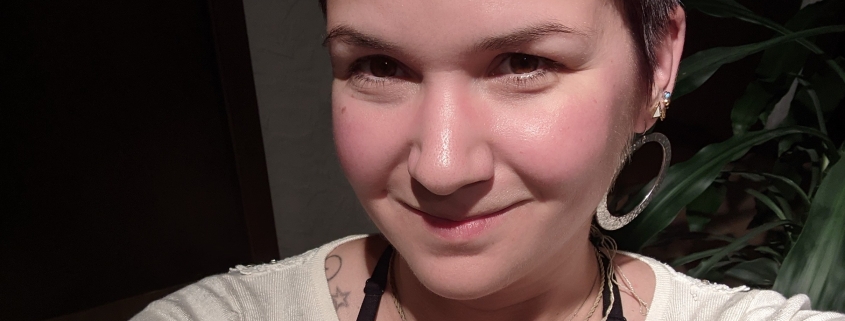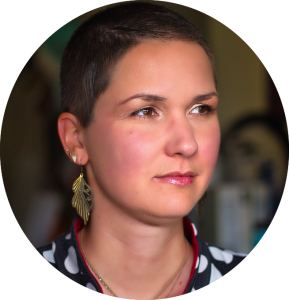Not losing yourself as a chronically ill person
My back hurts, sitting in an uncomfortable grey metal chair with red and white tape next to me, so nobody can sit down right beside me. I stare at the white wall that features a giraffe and a leopard – at least I think it’s a leopard, but I don’t know much about wild cats. I am too tired to google whether I am right or wrong. This is my last appointment of many this year at a specialized cardiology clinic specifically for people with connective tissue disorders.
Across the hall, a machine rattles in a somewhat relaxing rhythm and pumps oxygen into a young man’s lungs. It’s not the happiest of all places, and I don’t quite like being here – whether that’s because lately, thanks to my Ehlers-Danlos Syndrome, parts of my aorta, the blood vessel that transports blood away from the heart and into the body, may or may not be growing, or because this is a hospital mainly for severely ill children, and there isn’t much I find worse than if children have to go through something like this. I am saying parts of my aorta – to be more precise, the ascending part of it – may or may not be getting bigger, because I don‘t know for sure, which, for me, is much worse than knowing. A not-so-EDS-literate cardiologist measured it a few months ago, and if his results are true, it did grow by five mm over a couple of years. Not a good tendency with EDS or overall, I guess. However, I didn’t fully trust him and therefore went to an expert clinic to confirm these findings and order more tests, because the not-so-EDS-literate doctor was like, „Ah, that‘s OK. It‘s just slightly enlarged. You don‘t need to worry about that for the next at least ten years.“ Hm, yeah, I don‘t think so. If something in my body that is not supposed to get bigger, in fact, does get bigger, I do feel I want the opinion of people who see this a bit more often than never.
So I need to be here right now, whether I like it or not, because my heart needs to be reevaluated, my aortic root needs to be measured, and even though I can do a lot myself, I am not yet able to get my own ultrasound machine and measure my blood vessels myself. Maybe in the future. I am incredibly exhausted from the last weeks and don’t feel up for talking, but I have so many questions for the doctor, I have to force myself to open my mouth. I don’t know if you feel the same way about this, but sometimes, when I see many doctors in a short amount of time, I get so tired of spending all my life in waiting rooms that I simply just want to get it over with the fastest possible way. No talking, no kind words, just in, the tests, and out. On the other hand, to achieve the quality of life I want to have, I have to discuss, ask questions and listen.
And it’s not only that I spend so much time IN clinics. No, the preparation for an appointment starts long before I sit down face-to-face with my doctor. I have to put together the most recent reports that could be useful for the specialist, get up-to-speed with the latest scientific findings in terms of EDS, the heart and blood vessels; I need to figure out what symptoms I should mention and which are likely irrelevant – asking myself whether this skipping a beat my heart does every now and then isn’t important because it seems to relate to my neck issues or whether it could be harmful to me if I don’t mention it. Then I have to plan how to get to the clinic because apparently, specialists are never near my hometown. I need to book trains, pack my bags, and basically lose the whole day just for one single appointment. I guess you can hear my frustration through the last lines I wrote. Every appointment needs planning before, during, and after it. Being sick is more than a full-time job.
Gosh, how many hours of my life have I already or will I in the future waste on this chronic condition that I – and nobody else – deserves or wanted to have? My ears hurt from wearing my face mask for hours without a break, my stomach is upset from not eating anything today, I have a headache because I couldn’t drink anything since my train was packed with maskless people, and I am still trying to be very safe and act responsibly in terms of COVID, and this waiting room is equally full with people just like me waiting to hear some good news for a change. But will it be good news?
Usually, I am rather relaxed when I have my routine screenings because so far, I have been fine – by fine, I mean that I only have one potentially life-threatening condition, but that’s OKish managed at the moment (and I am knocking on wood because I want it to stay that way). Now, I am sitting here staring at the guy with the big brown bag with his little but surprisingly loud machine in it and ask myself how I’ll possibly manage to deal with more issues? I know, I know, with EDS, there is always another problem arising, but sometimes I am not sure how many more I can bear.
In the last two years, my conditions were mostly ‚stable‘ – funny word considering my body mainly consists of unstable joints. I had a baseline of pain, a baseline of symptoms, a baseline of better and worse days. I learned strategies to adapt my life around my disability and was able to take care of my needs, work a little, and even push forward my career as a disabled journalist in a way I never thought was possible. I was happy with where I was in life – personally and professionally. However, the foundation is brittle when you live with a chronic illness such as EDS; I just hoped I would be granted a few more months or even years with my condition not progressing to a new shitshow level. Maybe it won’t and I am concerned for nothing; maybe it will, and I’ll likely cope somehow, just like I did the years before.
These periods, when EDS moves to a higher level of shit, are the hardest for me because they cost so much time and energy to figure out how to adapt to your new situation and make it your new baseline. It always makes me feel like I am about to lose myself (again). It‘s this uncertainty – by far my most hated word in the world – when you don‘t know how much worse it can get. It‘s this loss of control over your life. You feel helpless, vulnerable, and alone. It‘s like you have to go through the grief process over and over again, because even though you have worked so hard to reach acceptance, with every new level of shit, you likely grieve again. We constantly have to deal with losing body functions, hobbies, jobs, friends, partners, and whatnot. It‘s hard – and that‘s an understatement. But we are resilient because we are forced to be. It‘s not a choice; it‘s the collection of all our experiences as chronically ill people.
However, on days like today, I don‘t feel resilient. I feel like my chronic illness takes over my life and doesn‘t leave me any room for all the other things I am because I am much more than just sick. I am a badass journalist, a friend, a daughter, a partner. But right now, there is no room for anything else, and I hate this feeling. In the last weeks, I ran from appointment to appointment. If I was lucky, I managed to get an hour of work in. I haven‘t seen most of my friends in months; I haven‘t done something I really enjoyed in a long time. I am just existing for doctors at the moment, and that needs to change.
So once I am done here – and whatever news I will get – I am going to treat myself to something I enjoy. It might be sushi or maybe a good old Leberkässemmel (a roll with a thick piece of liver sausage, roughly translates to liver cheese, which really is nowhere near cheese). Maybe I‘ll take a bath once I am home and read a book that has absolutely nothing to do with illness. Or maybe I‘ll simply finish writing this blog post, because the one thing I love most in the world is writing, and just getting all these feelings out there makes me feel more alive, seen, heard, understood, and most importantly: found. I don‘t feel lost anymore. This is my life. Sitting in a waiting room, writing about how it really feels to live with a chronic illness. This is not being lost.













Leave a Reply
Want to join the discussion?Feel free to contribute!